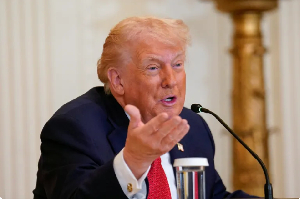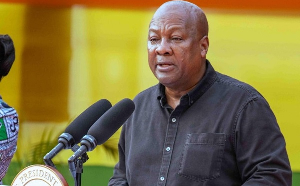A GNA feature by Richard Avornyotse
Accra, Oct. 10, GNA - "I shall be a doctor when I grow up," a little Ghanaian boy or girl would say in answer to his class teacher's or parents' question about what he or she would be when he/she grew up. Others would mention teaching, journalism, law, football, nursing, engineering, surveying, driving, accountancy, secretaryship, piloting, acting and many other fields of endeavour where they aspire to make a living in adulthood. They want to belong to a group of recognised practitioners, doing the same things repeatedly and earning money to take care of their needs. They want to be professionals who perform specialised functions and satisfy the needs of their clients and the larger society. They want to choose professions, which are dear to their hearts and live with them till they become infirm and unable to function effectively, when they bow out honourably in retirement.
The Oxford Advanced Learner's Dictionary defines profession as "paid occupation, especially one that requires advanced education and training." In simpler terms, therefore, a profession is the day-to-day activity that people with specialised training perform to earn a living. Journalism might essentially fall within this purview vis-a-vis the depth of training that one has to undergo to operate efficiently as a journalist. There are also copious intricacies of the profession that one has to grapple with in the discharge of one's duties as a journalist. And all these need specialised training to attain.
According to the Encyclopaedia Britanica "Journalism in the 20th century has been marked by a growing sense of professionalism." It attributed the new development to the increasing organisation of working journalists; specialised education for journalism; a growing literature dealing with the history, problems and techniques of mass communication; and an increasing sense of social responsibility on the part of journalists. Based on the above treatise, it is safe to define journalism as a profession.
It a truism that journalism requires specialised training for those who aspire to join the fold and ever since University of Missouri introduced journalism as a major course in 1897, many universities, colleges and institutes have developed course contents aimed at turning out journalists worth their salt. In most of such programmes, media law and ethics occupy prominent places because the profession, being the fourth estate of the realm, requires a high level of decency to forestall constant brush with the law and infringing on peoples' liberties.
Unfortunately, however, journalism as a profession in Ghana seems to have no rules of entry and exit. Day in day out, people of all walks of life join the fold, regardless of their ability or inability. While an un-certificated medical doctor or lawyer is referred to as a quack and, therefore, prohibited from practising, journalism is so vulnerable that there are more un-certificated practitioners than those who are trained to do the job.
A teacher who passes out of the university with a first class honours is discriminated against in the teaching profession in terms of status and salary and referred to as untrained until he obtains a post-graduate certificate or diploma in education. At other levels, they are derogatorily referred to as "pupil teachers." At present there appears to be no statutes, which prohibit people, without any rudimentary training in journalism, from parading themselves as journalists, even though in most cases, their conduct betrays the ethics of the profession.
Whereas in most professions there are regulatory bodies, which admit and expel members based on their learning and conduct, the Media Commission in Ghana, to say the least, remains an arbiter between journalists and those they offend. The trend has, therefore, encouraged many people, who flock venues of events, tugging files in their armpits and calling themselves journalists, looking for gratification from organisers. With the liberalisation of the airwaves and the emphasis on Ghanaian languages by some of the FM stations, the situation has indeed gone out of control, as caution is thrown to the wind and 'Katrina' and 'Rita' are allowed to cause immeasurable havoc.
Unfortunately, however, there is no regulatory body with the muscle to curtail the operations of those who trample upon the profession, pushing it to the nadir and eroding the status and credibility of real journalists. Concerned as the real crop of journalists might be, journalism will remain the most vulnerable profession, with people of all shades claiming to be journalists and tarnishing the image of the profession. Until there are regulations to admit and fire practitioners, more shady characters claiming to be journalists will infiltrate the profession. A profession requires special training and anybody who belongs to it must be guided by a set of rules and regulations. It is about time the Media Commission, the GJA and media houses clearly defined, who a journalist was, and employed only those with the requisite training to ensure that the dignity of the profession was not allowed to further degenerate into the abyss of mediocrity.
Opinions of Monday, 10 October 2005
Columnist: GNA














